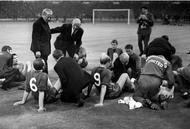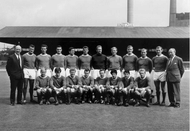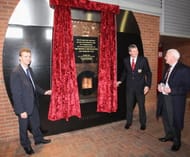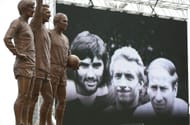All great things start with a dream. A dream may look like a futile musing, but when you work towards materializing it, with vision and purpose which marks your work, it has the power to revolutionize. Sir Alexander Matthew Busby, more popular as Sir Matt Busby, was also a dreamer, and had a dream to make Manchester United FC count amongst Europe’s elite. It’s not that Busby dreamt of this from his childhood. The thought of being knighted during his life time would not even have occurred to him.
At the time of his birth, the doctor jokingly told Busby’s mother that a footballer had been born in the family. Even though Busby frequently accompanied his father, who was a miner, to the coal mines, he only had one true goal. He aspired to become a professional footballer. He did manage it and that too with distinction. He went on to play for Manchester City, Liverpool and even a few games for Chelsea. After his playing career, Busby entered into management, where he would eventually earn legendary stature.
His football coaching in the Army Physical Training corps during the Second World War added value to his CV and Liverpool came calling. The Reds offered him an assistant-coach role. Busby’s demand for more control in the team governance was not acceptable to the Liverpool board, and he was allowed to look for an employer who would permit him to do so. The Footballing Gods made this possible and the new employer turned out to be Manchester United. Busby even managed to convince the United chairman to offer him full control over team selection, training and transfers without any interference from the United board, citing the fact that he knew more about the game than them.
In 1945, when Busby took charge as the manager of Manchester United, the club did not even own a home ground. The Theatre of Dreams had been decimated by the Luftwaffe’s bombs during the Second World War. United had to share their cross-town rivals Manchester City’s home stadium, Maine Road. Busby knew he needed to pick up the pieces of brokenness and take it one day at a time.
29th MAY 1968, European Cup Final, Wembley, London, Manchester United (4) v Benefica (1), Manchester United manager Matt Busby and assistant Jimmy Murphy (L) talk to players during the break before extra-time.
Finding Jimmy Murphy amongst the non-commissioned officers training for Army Physical Training corps team turned out to be Busby’s first of many master-strokes. Murphy immediately accepted the assistant-manager role offered to him by Busby. The two set out to rebuild United and make them the top team in the country.
Their effective leadership soon began to reap dividends. Manchester United finished runners-up in the league for three consecutive seasons from 1947-1949. An FA Cup victory in 1948 was the first winners’ medal under Busby. And after finishing as league runners-up again in 1951, United finally won the league championship in 1952, which would be their first league championship in the post-war era. With the side aging, Busby soon sensed the requirement to inject some fresh blood into the side. This would be the start of the “Busby Babes” era. The skeptics thought that Busby would spend huge to replace and refresh his aging side. Instead, Busby displayed a keen interest in developing the youth and soon introduced them to the first team.
In came players like Duncan Edwards, Bobby Charlton, Bill Foulkes, Mark Jones, Jackie Blanchflower, Billy Whelan, Dennis Viollet, and David Pegg, who would become the mainstay of the United side in the coming years. Duncan Edwards was the most gifted and talented player of that era, having made his debut for the club at 16, and picked by Busby when he was only 12.
The youngsters aged 16-17 gradually gelled together and helped United to the league title in the 1955-56 season. It was unbelievable, as the team had an average age of just 21, and all the players came from the youth system, with a few exceptions. Tommy Taylor was bought for just under £30,000, and he formed a fearsome strike-partnership with Dennis Viollet. Busby did not want to add extra pressure on Tommy by making him a £30,000 buy, and hence, pulled a pound back from his wallet just before paying for him. Harry Greg, the goalie, was the other major signing in a period of four years.
The “Busby Babes” had arrived, and they proved that they were not a one-season wonder by retaining the league title in the 1956-57 season. Matt Busby, even though pleased with domestic dominance, was aiming for greater things, and in the newly inaugurated European Cup competition he saw a chance to place his side amongst the legends. But first, he had to convince the English FA to allow United’s participation in the European Cup.
The 1955 English Champions, Chelsea, were prevented from entering the continental competition. FA secretary Alan Hardaker thought it to be a mindless distraction, an attitude which even saw England not participate in the World Cups prior to the Second World War. Busby was a visionary, and he knew that only at the European stage could his side prove their mettle amongst the elite of the continent. With the support of FA chairman Stanley Rous and Manchester United chairman Harold Hardman, Matt Busby and his youthful side embarked on their first European adventure in the 1956-57 season.
Manchester United 1st Team Squad, Back row, left-right, Matt Busby (Manager), Noel Cantwell, David Sadler, Bill Foulkes, Shay Brennan, David Herd, Harry Gregg, David Gaskell, Graham Moore, Maurice Setters, Pat Crerand, Jimmy Murphy (Assistant Manager), Front row, left-right, Bobby Charlton, Ian Moir, Albert Quixhall, John Connelly, Nobby Stiles, George Best, Tony Dunne, Denis Law.
They were knocked out in the semis by a great Real Madrid side. In spite of the arduous journey involved, and the risky air travel those days, Busby dared to venture into Europe again the next season. A successful defence of their league title qualified United into Europe, and they were billed as one of the favorites owing to their impressive showing in their debut campaign.
The 1957-58 season carried a lot of promise. United had made it to the quarters of the European Cup, where they would face Red Star Belgrade of erstwhile Yugoslavia. A 2-1 first leg victory at Old Trafford kept United in the hunt. Before their fateful second-leg away at Belgrade, United played out a classic, beating Arsenal 5-4 in what would turn out to be the Busby Babes’ farewell game in the British Isles. United were chasing a third consecutive league championship, a feat previously achieved by Arsenal, and also had the European Cup in their minds. A chartered plane through British European Airways was arranged so that United could be back in time from Belgrade for their potential league-deciding match against league leaders Wolverhampton Wanderers.
Busby’s team raced into a 3-0 half-time lead against the Yugoslavs, with goals from Dennis Viollet and Bobby Charlton. Although Red Star pegged back United and leveled the score to 3-3, the draw was enough to take United to their second successive European semi-final. The BEA flight 609 landed in Munich-Riem airport for refueling as scheduled, as the direct trip from Belgrade to Manchester was out of range for the Airspeed Ambassador Elizabethan class plane. Once done, Captain James Thain and co-pilot Kenneth Rayment prepared for take-off, but the boost readings did not reach the required mark and they had to call off the take-off. The second trial also resulted in the same, and the plane was sent back to the terminal for inspection.
All the players were eager to return back home, as those days there was no internet or mobile phones. The pilots looked confident for a third attempt at take-off, and all the passengers gathered back. The anxiety had grown on everyone. Snow had started to fall that afternoon of February 6th 1958, and slush had formed on the runway. The anxiety turned into bitter agony and devastation as the plane failed to take-off and crashed into the perimeter fence at the end of the runaway.
21 of the 44 passengers were killed on the spot. A fateful tragedy had occurred from out of the blue, and the dream of Matt Busby lay broken as he struggled for his life. The deceased included 7 United players: Geoff Bent, aged 25; Roger Byrne, the captain, 29; Eddie Colman, 21; Mark Jones, 24; David Pegg, 22; Tommy Taylor, 26; and Billy Whelan, 22. Three staff members, including club secretary Walter Crickmer and chief coach Bert Whalley, eight journalists, co-pilot Kenneth Rayment, and two other passengers also lost their lives. The survivors were rushed to the hospital in make-shift ambulances.
In this handout image supplied by Manchester United, David Gill of Manchester United and Roger Bryne Jnr unveil a new exhibition in honour of the Busby Babes to mark the 50th anniversary of the Munich Air Disaster at Old Trafford on February 6 2008 in Manchester, England.
Bobby Charlton fortunately escaped with minor injuries. Busby was severely injured; in-fact the doctors had given up on him and he twice received his last rites, before recovering eventually. Duncan Edwards was not that fortunate, and succumbed to his injuries. Jackie Blanchflower and Johnny Berry were forced into retirement as a result of their horrific injuries. Charlton would be a man changed forever after that incident, and Matt Busby gradually came back to football after words of encouragement from his wife Jean.
The loss of the players and other passengers was deeply mourned in the city of Manchester. The city had turned into a funeral centre. The whole of Britain had come to a standstill, and everyone associated with the club were in a state of shock and denial. Huge funeral processions accompanied the dead to their grave. The community felt that they had lost someone they knew. Most of the players came from humble, working class families, and the earnings of the players those days were only slightly higher than those of the working class people.
This resulted in a more close attachment between the players and their supporters. Even rival clubs like Liverpool and Nottingham Forrest offered invaluable help during those dark times for United. An Aston Villa player signed for United an hour before their kick-off against Sheffield Wednesday. The F.A had relaxed the rule that players who are cup-tied to one team can’t play for other team, for United. Real Madrid and Red Star Belgrade even requested UEFA to make United the honorary European Champions for the 1958 season.
In the face of adversity club chairman Harold Hardman announced that the club would play out their remaining fixtures for the 1958 season. Assistant manager Jimmy Murphy, who was not on that plane as he had to manage his native country Wales in a World Cup qualifier, lead the depleted United side mostly formed of reserve players and the survivors of the Munich air-crash for the rest of the season. United won their first match after the crash against Sheffield Wednesday 3-0, but failed to win another game, finishing a mediocre 9th in the overall league standings.
They lost to AC Milan in the semi-finals of the European Cup, despite winning the first-leg 2-1. But defying all odds, the cobbled-up United side made it to the finals of the F.A cup in 1958. All the survivors – Charlton, Gregg, Viollet, and Foulkes featured in that final match. Even Matt Busby had come to the stadium hobbling on crutches. Although Bolton Wanderers dispatched United 2-0, the spirit of United, personified by the Eagle crest on their shirts, had won over their fans. The “Never Say Die Attitude” of the club had been written down in the hearts of everyone associated with the club in indelible ink.
The phoenix gradually rose from the ashes. The following summer, Matt Busby returned to the helm and started from scratch again on the road to recovery with his loyal friend Jimmy Murphy. The previously frivolous Charlton had taken on himself the burden to carry the United side to another period of glory as a tribute to the friends he lost in that fatal crash. Matt Busby, who had almost given up on his dream, saw the passion in Charlton which further inspired him to carry on and march towards his dream.
The statue of Manchester United’s ‘Holy Trinity’ of players stands in front of Old Trafford after being unveiled on May 29, 2008, Manchester, England. The statue of United legends Bobby Charlton, Denis Law and the late George Best came 40 years to the day since the club first lifted the European Cup. Charlton, Best and Law scored 665 goals between them for United and between 1964 and 1968, all won the coveted European Footballer of the Year award.
The Munich tragedy had earned the club a huge following, and the players also wanted to join the club due to its history as the tragedy had catapulted the club into the limelight as the age of information and communication technology dawned. George Best confessed in his autobiography that although he was a Wolves fan, he signed for United after hearing about Busby and the Munich disaster. Best was 11 years old when the air crash happened.
Step by step, and little by little, Busby formed another great United team, who captured the league title in 1965-66 and 1967-68. After being the club manager for 22 years, Matt Busby’s dream finally came true, as Charlton’s goals gave United a famous victory in the European Cup final against Eusebio’s Benfica at the Wembley stadium in 1968. The legend was formed; a legend was completed; and a dream was finally fulfilled.
Matt Busby had done it. Bobby Charlton had fittingly given a tribute to eight of his closest friends he lost a decade back. Manchester United had risen from the ashes once again under Matt Busby. The sun would set on Busby’s era, but the spirit of Manchester United had gained immortality.
Sir Alex Ferguson would emulate Sir Matt Busby, with Fergie’s Fledglings dominating the Premier league and conquering Europe in typical United fashion in 1999 with a famous comeback win against Bavarian giants Bayern Munich. But the foundations were laid in that year 1945, when a strong-willed Matt Busby was appointed the manager of Manchester United.
Tragedy is a part of life and carries a latent power. A power to transform individuals into extraordinary ones. The affection and the relationship we hold with our dear ones who pass away before us, give us the extra impetus to succeed for their sake and fight for what they stood for. Bobby Charlton personified that, and his emotional connect with his friends pushed him to succeed. The “Busby Babes” under the wings of Sir Matt Busby laid down the template on which the United of today, march on.





